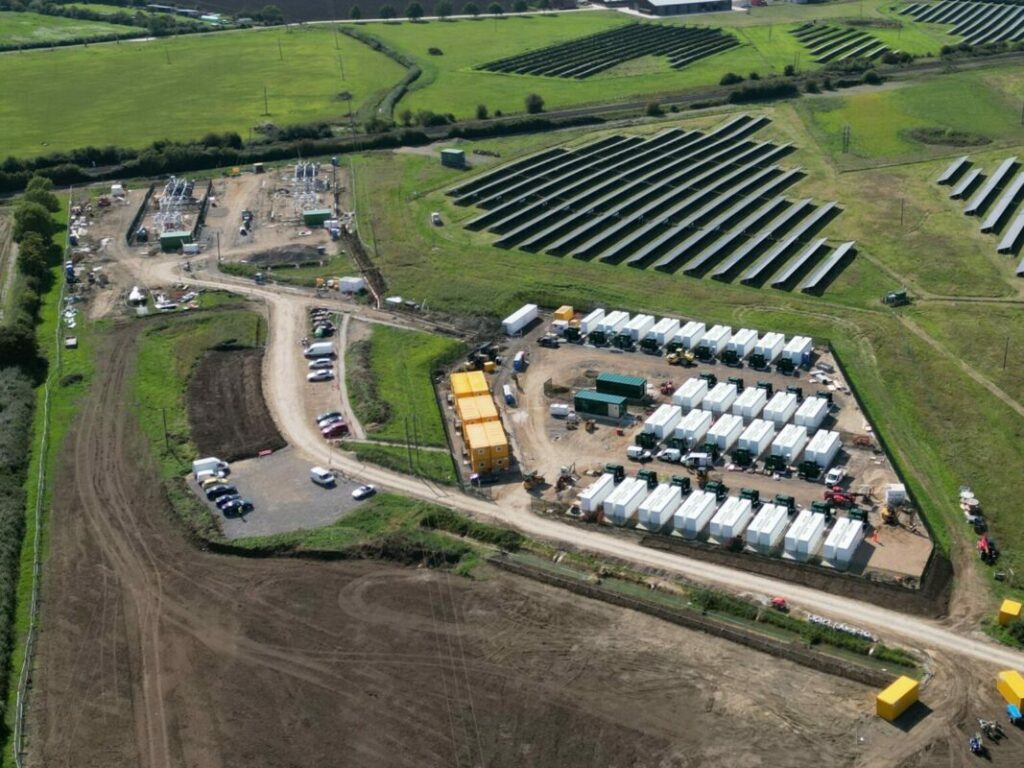
Battery storage investment firm Harmony Energy Income Trust (HEIT) has signalled that battery energy storage system (BESS) revenues for the year ended 31 October 2023 were markedly lower than the same period in 2022.
Revealed in the firm’s recent trading update, the discussion around a “weak revenue environment for BESS assets” echoes the thoughts of Gresham House Energy Storage Fund, another major UK-based storage investor, who said earlier this week that this was due to assets not being able to participate in balancing the GB grid or replacing gas-fired generation to their fullest capability. This was reported by our sister site Energy-Storage.news yesterday (1 February).
Although HEIT did not reveal the financial impact the weaker environment has had on its BESS assets fully, its quarterly net asset value update and audited annual results are earmarked for later this month and should provide further clarity.
Multiple factors contribute to a reduction in revenue which ‘exceeded market expectations’
HEIT revealed multiple drivers that contributed to a reduction in revenue that “exceeded market expectations”, specifically in a macro and sector-specific sense.
The first major influence is the saturation of ancillary service markets. Due to the high rate in the buildout of BESS projects in GB – with Modo Energy revealing a record 1.5GW having come online across 2023 – this has led to the saturation of ancillary services and thus driven record low clearing prices.
Interestingly, this was “widely anticipated” and the firm’s two-hour duration BESS portfolio is positioned to protect against the event and the wider balancing mechanism (BM). However, Energy-Storage.news previously reported that the impact had been “far sharper than projected” and thus rocked numerous BESS portfolios including Gresham House.
The second major influence is a reduction in wholesale power price volatility following the peak of the energy crisis. According to Harmony Energy, wholesale spreads in the financial year 2023 and Q1 2024 have narrowed “primarily due to a reduction in natural gas prices, itself due to milder than expected weather and high levels of European reserves”.
Indeed, it is important to note that whilst the energy crisis peaked in 2022, energy prices remained high throughout 2023. Consultancy Cornwall Insight does not anticipate prices to reduce to pre-2021 levels until late into the decade. The current issue is that prices remain high for consumers and thus less energy is being consumed reducing the overall energy demand in the GB, a trend that has been observed by the International Energy Agency (IEA).
HEIT’s trading update outlined that wholesale price spreads are “forecast to increase during 2024 and beyond” driven by various factors including increased consumer energy demand as the energy crisis subsides, continued electrification of the nation’s heating and transport infrastructure as well as greater penetration of renewable, intermittent generation.
The final major influence on HEIT’s portfolio was implementation issues of National Grid ESO’s Open Balancing Platform, another aspect that had previously been referenced by Modo Energy in contributing to December having the lowest BESS revenues since 2020.
The platform, which introduced bulk dispatch functionality, allows for more instructions to be issued to batteries at any one time but, due to technical issues, the control room reverted to legacy systems for dispatching batteries on 15 December.
HEIT stated that the software re-launched on 8 January 2024 with it only in use on an intermittent basis. This has led to HEIT seeing some days of high balancing mechanism volume and some of zero.
Due to a reliance on artificial intelligence (AI) software and algorithms to execute revenue strategies, the inconsistent use of the Open Balancing Platform “not only limits BESS volumes in the BM but also creates uncertainty over how much daily capacity BESS can dedicate to other strategies and services”, the firm said.
To help mitigate the impact this is having on BESS portfolios, HEIT’s investment adviser has called for the consistent use of the platform in relation to BESS.
Solar Power Portal’s publisher Solar Media will host the 9th annual Energy Storage Summit EU in London, 20-21 February 2024. This year it is moving to a larger venue, bringing together Europe’s leading investors, policymakers, developers, utilities, energy buyers and service providers all in one place. Visit the official site for more info.

